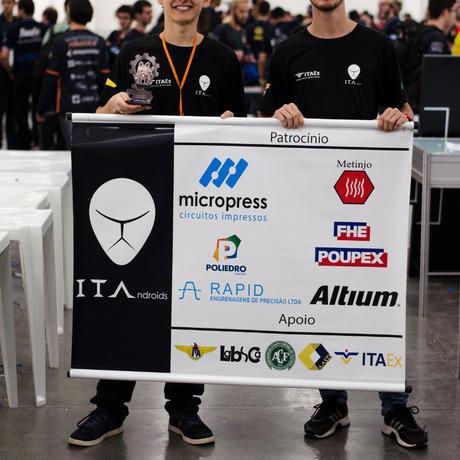ITAndroids2D
- 0 Collaborators
Robocup Soccer Simulation 2D League (Soccer2D) was the first league to be held by RoboCup, one of the most importants robotics competitions of the world (https://www.robocup.org/). In the Soccer2D domain, two teams of 11 autonomous agents must find a way to interpret incomplete noisy individual sensorial information and take actions under a virtual 2D environment in order to win a soccer match. Having a very limited communication, they need to balance individual and cooperative play in their decision making while being capable of reacting to opponent behavior. ITAndroids2D is the Soccer2D research branch of ITAndroids, a research group in robotics of Instituto Tecnológico de Aeronáutica from the Laboratory of Autonomous Computational Systems (LAB-SCA). ...learn more
Project status: Under Development
Overview / Usage
The project mainly aims to enhance a team of 11 autonomous agents and one observing coach that competes in the Robocup Soccer Simulation 2D League. The project is mainly based on Agent2D (© 2011 H. Akyiama), the base team released by the HELIOS team. ITAndroids2D team participates annually in Robocup, Latin American Robotics Competition (LARC) and regional events.
Some of the study areas tackled in the project are:
- Behavior-based robotics
- Localization and object Tracking with noisy incomplete individual relative information
- Agent modeling on noisy environments
- Individual-Collective reasoning and coordination
Methodology / Approach
The robotic agent reasoning architecture consists of a perception-model-decision-action cycle. Apart from software engineering solutions created by the members, some of the currently used techniques/advancements are:
1- Particle Filters for self localization in the soccer field.
2- Delaunay Triangulation based on Voronoi Diagrams for collective positioning.
3- Best first tree search heuristic for action selection, combining action generation and state evaluation heuristics.
4- Neural networks for online aggresive reasoning
5- Minimum Bipartite Graph Matching modeling for deffensive responsability assignment
Currently under development/ future development features are:
1- Deep Reinforcement Learning platform for individual player behavior
2- Precise player undercover parameter estimation with neural networks
3- Multiagent tracking with RFS filters
4- Value based action planning with Monte Carlo Tree Search heuristics
Technologies Used
Main Stack: C++, Boost, Python.
Compilation system: CMake
Other languages: Java, Bash.
ML Frameworks: Tensorflow, Keras
Data Analysis: Pandas, NumPy, SciPy




